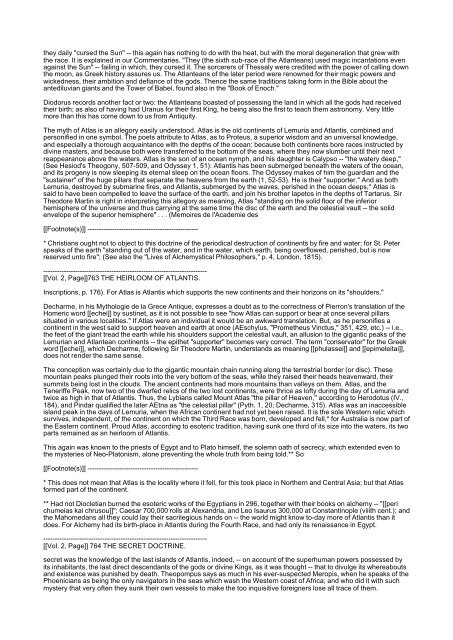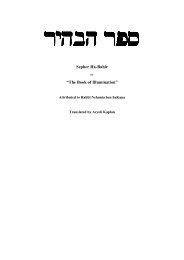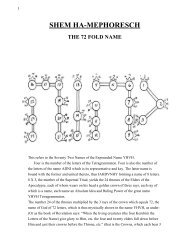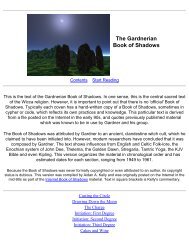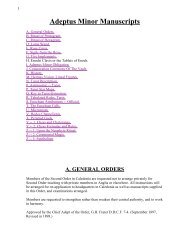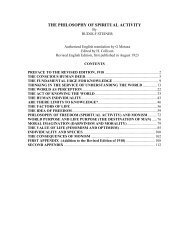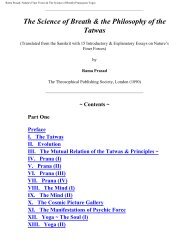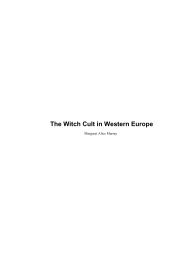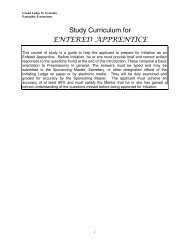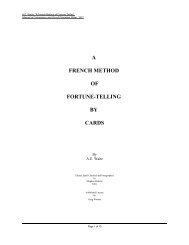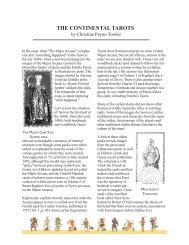Band 2 Anthropogenesis - H.P. Blavatsky
Band 2 Anthropogenesis - H.P. Blavatsky
Band 2 Anthropogenesis - H.P. Blavatsky
You also want an ePaper? Increase the reach of your titles
YUMPU automatically turns print PDFs into web optimized ePapers that Google loves.
they daily "cursed the Sun" -- this again has nothing to do with the heat, but with the moral degeneration that grew with<br />
the race. It is explained in our Commentaries. "They (the sixth sub-race of the Atlanteans) used magic incantations even<br />
against the Sun" -- failing in which, they cursed it. The sorcerers of Thessaly were credited with the power of calling down<br />
the moon, as Greek history assures us. The Atlanteans of the later period were renowned for their magic powers and<br />
wickedness, their ambition and defiance of the gods. Thence the same traditions taking form in the Bible about the<br />
antediluvian giants and the Tower of Babel, found also in the "Book of Enoch."<br />
Diodorus records another fact or two: the Atlanteans boasted of possessing the land in which all the gods had received<br />
their birth; as also of having had Uranus for their first King, he being also the first to teach them astronomy. Very little<br />
more than this has come down to us from Antiquity.<br />
The myth of Atlas is an allegory easily understood. Atlas is the old continents of Lemuria and Atlantis, combined and<br />
personified in one symbol. The poets attribute to Atlas, as to Proteus, a superior wisdom and an universal knowledge,<br />
and especially a thorough acquaintance with the depths of the ocean: because both continents bore races instructed by<br />
divine masters, and because both were transferred to the bottom of the seas, where they now slumber until their next<br />
reappearance above the waters. Atlas is the son of an ocean nymph, and his daughter is Calypso -- "the watery deep,"<br />
(See Hesiod's Theogony, 507-509, and Odyssey 1, 51): Atlantis has been submerged beneath the waters of the ocean,<br />
and its progeny is now sleeping its eternal sleep on the ocean floors. The Odyssey makes of him the guardian and the<br />
"sustainer" of the huge pillars that separate the heavens from the earth (1, 52-53). He is their "supporter." And as both<br />
Lemuria, destroyed by submarine fires, and Atlantis, submerged by the waves, perished in the ocean deeps,* Atlas is<br />
said to have been compelled to leave the surface of the earth, and join his brother Iapetos in the depths of Tartarus. Sir<br />
Theodore Martin is right in interpreting this allegory as meaning, Atlas "standing on the solid floor of the inferior<br />
hemisphere of the universe and thus carrying at the same time the disc of the earth and the celestial vault -- the solid<br />
envelope of the superior hemisphere" . . . (Memoires de l'Academie des<br />
[[Footnote(s)]] -------------------------------------------------<br />
* Christians ought not to object to this doctrine of the periodical destruction of continents by fire and water; for St. Peter<br />
speaks of the earth "standing out of the water, and in the water, which earth, being overflowed, perished, but is now<br />
reserved unto fire"; (See also the "Lives of Alchemystical Philosophers," p. 4, London, 1815).<br />
------------------------------------------------------------------------<br />
[[Vol. 2, Page]]763 THE HEIRLOOM OF ATLANTIS.<br />
Inscriptions, p. 176). For Atlas is Atlantis which supports the new continents and their horizons on its "shoulders."<br />
Decharme, in his Mythologie de la Grece Antique, expresses a doubt as to the correctness of Pierron's translation of the<br />
Homeric word [[echei]] by sustinet, as it is not possible to see "how Atlas can support or bear at once several pillars<br />
situated in various localities." If Atlas were an individual it would be an awkward translation. But, as he personifies a<br />
continent in the west said to support heaven and earth at once (AEschylus, "Prometheus Vinctus," 351, 429, etc.) -- i.e.,<br />
the feet of the giant tread the earth while his shoulders support the celestial vault, an allusion to the gigantic peaks of the<br />
Lemurian and Atlantean continents -- the epithet "supporter" becomes very correct. The term "conservator" for the Greek<br />
word [[echei]], which Decharme, following Sir Theodore Martin, understands as meaning [[phulassei]] and [[epimeleitai]],<br />
does not render the same sense.<br />
The conception was certainly due to the gigantic mountain chain running along the terrestrial border (or disc). These<br />
mountain peaks plunged their roots into the very bottom of the seas, while they raised their heads heavenward, their<br />
summits being lost in the clouds. The ancient continents had more mountains than valleys on them. Atlas, and the<br />
Teneriffe Peak, now two of the dwarfed relics of the two lost continents, were thrice as lofty during the day of Lemuria and<br />
twice as high in that of Atlantis. Thus, the Lybians called Mount Atlas "the pillar of Heaven," according to Herodotus (IV.,<br />
184), and Pindar qualified the later AEtna as "the celestial pillar" (Pyth. 1, 20; Decharme, 315). Atlas was an inaccessible<br />
island peak in the days of Lemuria, when the African continent had not yet been raised. It is the sole Western relic which<br />
survives, independent, of the continent on which the Third Race was born, developed and fell,* for Australia is now part of<br />
the Eastern continent. Proud Atlas, according to esoteric tradition, having sunk one third of its size into the waters, its two<br />
parts remained as an heirloom of Atlantis.<br />
This again was known to the priests of Egypt and to Plato himself, the solemn oath of secrecy, which extended even to<br />
the mysteries of Neo-Platonism, alone preventing the whole truth from being told.** So<br />
[[Footnote(s)]] -------------------------------------------------<br />
* This does not mean that Atlas is the locality where it fell, for this took place in Northern and Central Asia; but that Atlas<br />
formed part of the continent.<br />
** Had not Diocletian burned the esoteric works of the Egyptians in 296, together with their books on alchemy -- "[[peri<br />
chumeias kai chrusou]]"; Caesar 700,000 rolls at Alexandria, and Leo Isaurus 300,000 at Constantinople (viiith cent.); and<br />
the Mahomedans all they could lay their sacrilegious hands on -- the world might know to-day more of Atlantis than it<br />
does. For Alchemy had its birth-place in Atlantis during the Fourth Race, and had only its renaissance in Egypt.<br />
------------------------------------------------------------------------<br />
[[Vol. 2, Page]] 764 THE SECRET DOCTRINE.<br />
secret was the knowledge of the last islands of Atlantis, indeed, -- on account of the superhuman powers possessed by<br />
its inhabitants, the last direct descendants of the gods or divine Kings, as it was thought -- that to divulge its whereabouts<br />
and existence was punished by death. Theopompus says as much in his ever-suspected Meropis, when he speaks of the<br />
Phoenicians as being the only navigators in the seas which wash the Western coast of Africa; and who did it with such<br />
mystery that very often they sunk their own vessels to make the too inquisitive foreigners lose all trace of them.


